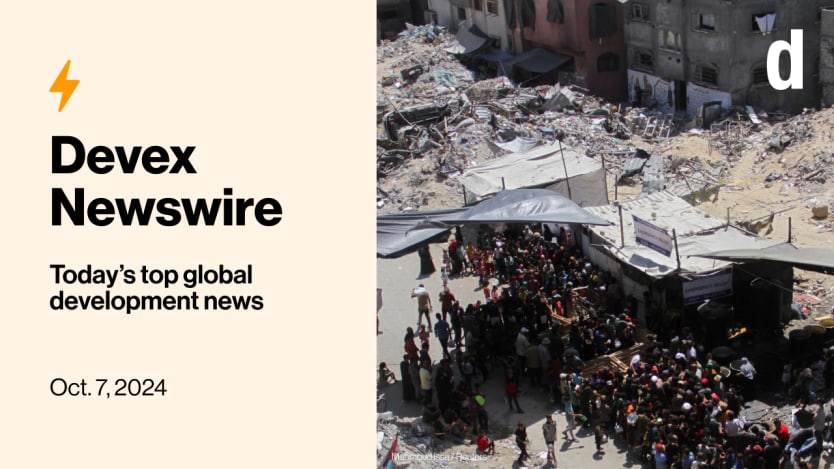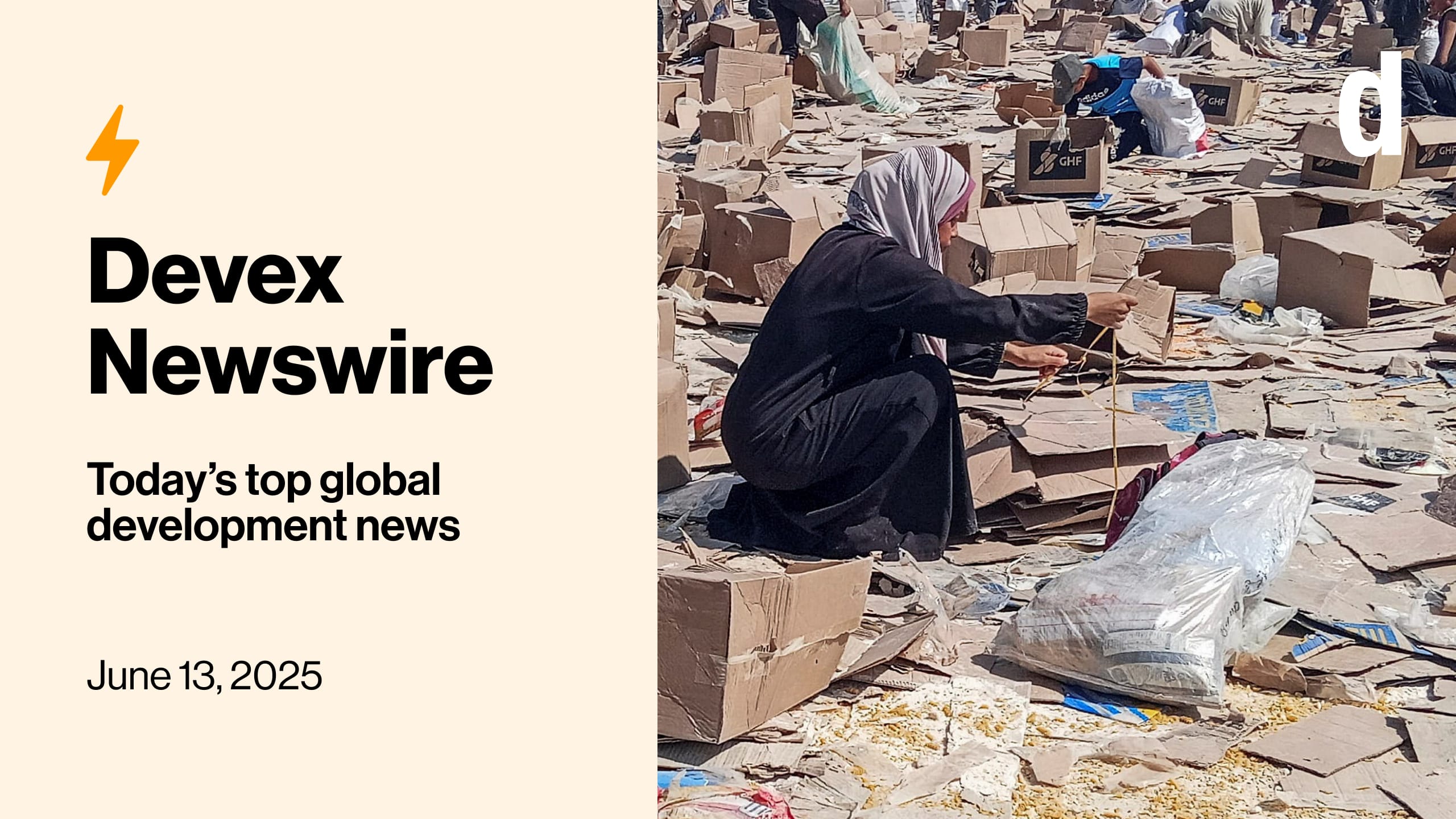
Today marks the one-year anniversary of Hamas’ attack on Israel that killed 1,200 people, which was followed by a full-scale siege on Gaza that’s left at least 41,000 dead. A year of ceaseless attacks has left the territory shattered, and now the conflict has spilled across borders.
Also in this edition: The race for the U.N.’s top humanitarian role, the fight for accessible TB treatment, and the curveball making mpox harder to find — and treat.
+ We need your insight — let us know how we can improve the Newswire to better meet your interests by completing this short survey. Thank you!
Gaza, one year in
This is a preview of Newswire
Sign up to this newsletter for an inside look at the biggest stories in global development, in your inbox daily.
Oct. 7, 2023, shook Israel to its core. A surprise rampage by Hamas massacred 1,200 people and saw over 250 taken hostage. U.S. President Joe Biden described it as the deadliest day for Jews since the Holocaust.
The slaughter triggered fierce Israeli military retaliation that has laid waste to Gaza.
For Fady al Madhoun, every day feels like the worst day ever. But the day after that, the Gaza-based doctor says, is always worse.
“There is no safe place inside Gaza,” says al Madhoun, who works for international humanitarian agency Médecins Sans Frontières.
For months, Madhoun has been seen crumbling buildings, so destroyed it feels like he’s standing in the middle of an earthquake. The shortage of essential hospital equipment and the lack of medicine for his patients. And 4-year-old Dina, who lost her right hand after being hit by an explosive.
“The war will end, sooner or later,” al Madhoun says. “But no one can return her hands.”
Al Madhoun and Dina are just two of thousands affected by the Israel-Hamas war. The war has made Gaza the most dangerous place in the world to be an aid worker, with at least 300 dead in the occupied Palestinian territories since the Israeli offensive began. And with the conflict now rippling through the Middle East, it’s unclear where things are headed next.
We’ve compiled the key figures after a year of conflict, along with a deeper look into the $3.62 billion of humanitarian aid that’s been sent to Gaza since the war began.
Read: What is the state of aid in Gaza? Key figures after a year of conflict
Check out the funding tracker: Who's sending aid to Gaza?
And ICYMI: How 7 deaths changed aid work in Gaza
+ Catch up on our coverage of the humanitarian crisis in Gaza.
The race begins
As Gaza reels from war, so too do many others. There’s Sudan, where half the country’s population faces starvation. Haiti, where gang violence has made life impossible. And the Democratic Republic of Congo, where rape has become an indiscriminate weapon of war.
In New York, the United Nations secretary-general is trying to decide who’s best placed to handle it all — and now, the search for the United Nations’ top humanitarian role is in its final stages, my colleague Colum Lynch exclusively reports.
“U.N. Secretary-General António Guterres has whittled the list down to two candidates: Robert Piper, an Australian-British national, and Tom Fletcher, a former U.K. ambassador to Lebanon and foreign policy adviser to three British prime ministers,” Colum writes.
The role has been held by a Brit since 2007, and the United Kingdom has offered up Fletcher as its official pick. Currently the principal of Hertford College at the University of Oxford, he has had no experience managing complex humanitarian operations — though the former diplomat was Britain’s youngest ambassador and a foreign policy adviser to three prime ministers.
Piper, on the other hand, has more extensive humanitarian experience: He’s served as the U.N.’s top humanitarian coordinator in Nepal, the occupied Palestinian territories, and the Sahel region — though he was declared persona non grata by the Israeli government during his stint in the Middle East.
Exclusive: UN humanitarian czar race heats up
ICYMI: The UN's big power job monopoly (Pro)
Dose of justice
Shifting from the humanitarian sector to the world of global health, we dive right into tuberculosis — the multidrug-resistant kind. It took three years for Phumeza Tisile to recover from the condition, and by the time Tisile was cured, she had gone deaf from the treatments she’d received.
It wasn’t for another decade that bedaquiline, a safer TB treatment developed by the drug company Johnson & Johnson, would become available across the world. And that was only after survivors like Tisile — along with a slew of other advocates, policymakers, and organizations — did everything they could to drive bedaquiline’s price down.
For years, the treatment went through phases. It was first offered within a tiered pricing model, and then channeled through a USAID donation program. After that, it became the subject of legal battles in India, Thailand, and beyond. It took time, Devex contributor Andrew Green writes, but ultimately, the yearslong battle for affordable bedaquiline changed everything — not just for TB patients, but for the global health sector as a whole.
“Advocates and policymakers are now looking to these efforts for strategies they can replicate in their attempts to make other groundbreaking treatments more widely available,” Andrew writes. “That includes taking early steps to monitor companies as they file patent claims, but also thinking about partnerships that might facilitate quicker access even while patents are in place.”
Read: Fighting drug-resistant TB was costly. Here's how that's changed
Untraceable
While that’s good news for the TB world, there’s less of that when it comes to mpox — a disease that’s killed over 840 people on the African continent this year.
The majority of mpox cases have no epidemiological link, my colleague Sara Jerving reports, meaning they’re popping up among people that health workers aren’t monitoring, and who aren’t known to have been in contact with previously identified cases.
“That shows that your surveillance is not working, which is the reality in most of these countries,” says Dr. Ngashi Ngongo, the coordination lead of the continent’s mpox response for the Africa Centres for Disease Control and Prevention.
The goal is to monitor the contacts in at least 90% of cases. But, according to Africa CDC, health workers have done so for less than 4% of identified cases.
Read: The majority of mpox cases can't be tracked
+ For the latest insider and behind-the-scenes coverage of global health, sign up for Devex CheckUp, a free, weekly newsletter.
Follow the money
As the United Nations recovers from its Olympics — the U.N. General Assembly — my colleague Miguel Antonio Tamonan took a closer look at its $74.3 billion wallet.
In 2022, the World Food Programme took home the biggest portion of U.N. funding, pocketing nearly 20% of the sum total. In large part, that came from a surge in funding from the United States, which upped its voluntary contributions to WFP by $3.4 million that year alone. UNICEF ranked next, and the U.N. Secretariat followed, with all three allocations to the top-funded agencies increasing from 2021 to 2022.
On the donor side, more than one-third of all the U.N.’s money came from the U.S. The country’s whopping $18.1 billion contribution represented a nearly 45% increase from 2021, Miguel finds. The U.N.’s next top donors were Germany, Japan, the United Kingdom, and China.
Read: Inside the finances of the United Nations (Pro)
+ Interested in more funding coverage? Start your 15-day free trial of Devex Pro today to access all the exclusive reporting and analyses on our funding insights page in addition to other exclusive news content for Pro members.
In other news
Colombia is proposing a unified climate and biodiversity pledge at the upcoming U.N. COP 16 biodiversity summit to streamline global environmental protection. [Reuters]
The U.S. has committed $157 million in new humanitarian aid for conflict-affected populations in Lebanon and surrounding areas, aiming to support internally displaced persons and refugees. [Al Arabiya]
Rwanda launched a vaccination campaign Sunday against the deadly Marburg virus amid a deadly outbreak in the East African nation. [VOA]
Sign up to Newswire for an inside look at the biggest stories in global development.








